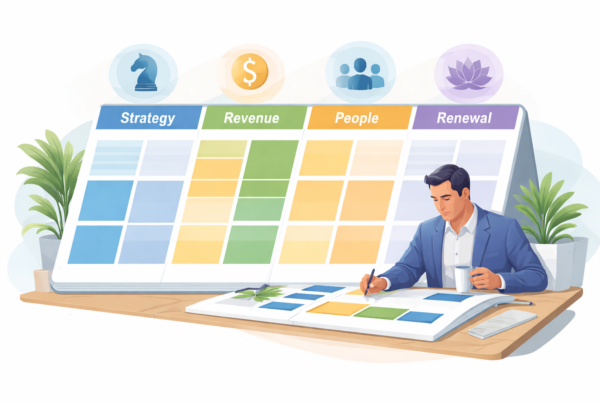Maximizing Success: Your Guide to Becoming an Effective Manager
Becoming an effective manager is not always smooth, but the rewards are undeniable. Great managers empower their teams, foster collaboration, and drive organizational success. Are you ready to embark on the journey to maximize your success and become an effective manager? Let’s begin by exploring the foundations of effective management and delve into strategies for boosting employee motivation, managing diverse teams, enhancing leadership skills, and balancing management responsibilities.
Key Takeaways
- Effective management is based on emotional intelligence, communication skills and adaptability.
- Boost employee motivation by setting clear goals, recognizing achievements and providing development opportunities.
- Enhance leadership skills through continuous learning, feedback from others and self-reflection. Balance responsibilities with delegation techniques, time management strategies & a healthy work/life balance.
The Foundations of Effective Management

Effective management relies on a strong foundation of emotional intelligence, communication skills, and adaptability. Exceptional managers recognize the synergy of these elements in creating a positive work environment, sustaining employee motivation, and driving success. On the other hand, mediocre managers often find it challenging to engage with their teams and adjust to fluctuating scenarios. Prioritizing these core skills propels you towards becoming a more successful manager and elevating your team.
The upcoming sections provide a comprehensive analysis of these skills and guidance on their development and refinement. As you proceed, remember that evolving into a proficient manager requires time and commitment. Embrace the process and witness the growth of your leadership capabilities.
Emotional Intelligence

Emotional intelligence is the cornerstone of effective management. It involves understanding and managing one’s own emotions, as well as the emotions of others, allowing you to:
- Lead and manage team dynamics effectively
- Recognize and comprehend emotions
- Build relationships
- Direct challenging situations
- Adapt to various circumstances
- Encourage a supportive and compassionate atmosphere
A good manager, like a great manager, great managers, and great leaders, leverages emotional intelligence to cultivate a positive work environment.
Managers can boost emotional intelligence through the following:
- Self-awareness
- Empathy development
- Communication skills refinement
- Relationship building
- Stress management
- Feedback solicitation
- Commitment to continuous learning
Enhancing emotional intelligence equips you with a better understanding of team dynamics, the ability to nurture a positive work environment, and decision-making skills based on comprehensive information.
Communication Skills
Effective managers must possess strong communication skills to convey expectations, provide feedback, and maintain open channels for team collaboration. Communication skills allow managers to assign tasks, manage disagreements, inspire employees, and cultivate relationships. Weekly meetings, for example, can enable effective leaders to gain insight into each employee’s progress, create a trusting relationship, and foster increased productivity.
Managers, including the managing director, ought to maintain transparency with their direct reports regarding their expectations and conduct regular goal reviews. Proficient communication skills speed up approvals and streamline team workflows. Listening also plays a pivotal role in effective management, allowing managers to understand their team’s needs, concerns, and desires, making them feel valued. Constructive feedback provision and nurturing enduring relationships with employees are vital communication strategies for efficient management.
Adaptability
Adaptability is essential for managers to navigate change, address challenges, and tailor their leadership approach to individual team members’ needs. Adaptable managers are more successful than average managers, as they can adjust to changing circumstances, address issues, and customize their leadership approach to the individual needs of their team members.
To develop adaptability skills, proficient leaders should:
- Be open to making errors and learning from them
- Actively seek learning opportunities
- Embrace change and entertain new ideas
- Sharpen cognitive, social, and behavioural flexibility
- Solicit colleague feedback in a safe transformation environment.
Discover our 12-Week Management Masterclass
Click HERE to find out more and speak to a coach.
Strategies for Boosting Employee Motivation

Boosting employee motivation is a critical component of effective management. Managers can positively impact employee motivation and overall team performance by setting clear goals, recognizing achievements, and providing opportunities for growth and development. Establishing specific objectives, acknowledging accomplishments, and helping develop and progress opportunities employees advance in their career path.
The upcoming subsections will analyze diverse strategies for enhancing employee motivation, including clear goal setting, recognition of employee achievement and rewards, and provision of growth opportunities. Implementing these strategies empowers you to cultivate an environment where highly motivated employees are dedicated to success.
Setting Clear Goals
Setting clear and measurable goals is essential to help employees understand expectations and work towards a shared vision of success. SMART goals can bolster the efficacy of goal setting in management by providing a well-defined structure for setting goals that are:
- Specific
- Measurable
- Achievable
- Relevant
- Time-bound
This precision helps to augment motivation, concentration, and responsibility, resulting in improved performance and success in accomplishing goals.
Managers need to be careful while setting objectives to avoid mistakes such as:
- Setting unreachable goals
- Misalignment of goals with company-wide objectives
- Overloading with too many goals
- Setting vague goals
- Overlooking short-term goals
Employing project management software proves advantageous in managing workflows and tracking the progress of tasks assigned to each employee.
Recognition and Rewards
Consistent recognition and rewards for employees’ achievements foster a positive work environment and encourage sustained high performance. Various methods available for managers to recognize and reward employees include:
- Promoting colleague appreciation
- Providing affirmation and feedback
- Formulating a recognition strategy
- Publicly recognizing employees on social media
- Personalizing recognition and rewards
- Implementing gamification
- Offering time off or small gifts
- Creating an employee recognition program
- Auditing current strategies for improvements
Studies indicate monthly recognition boosts productivity, job dedication, and general engagement. By incorporating recognition and rewards into your management strategy, you can create an environment where employees feel valued and motivated to perform at their best.
Providing Opportunities for Growth
Offering growth and development opportunities like training and mentorship enables employees to realize their full potential. Career development and skills training benefits employees by:
- Enhancing retention
- Increasing job satisfaction
- Boosting productivity
- Increasing engagement
- Improving performance
Establishing an employee mentorship program and providing career development and skills training enables managers to foster their employees’ maximum capability. By offering growth opportunities, managers can create a supportive and collaborative environment where employees can:
- Learn from experienced mentors
- Gain new skills and knowledge
- Develop their career paths
- Build strong professional networks
- Increase job satisfaction and engagement
This ultimately leads to employees motivated, thriving, and excelling in their roles as employees respond positively to the work environment.
Managing Diverse Teams

Managing diverse teams requires:
- Understanding individual needs, fostering inclusivity and collaboration, and supporting remote workers
- Gaining an understanding of each team member’s individual needs, strengths, and preferences
- Facilitating inclusivity and collaboration within diverse teams by leveraging the unique strengths and innovative ideas of team members
- Recognizing and rewarding contributions
- Managing team dynamics effectively
- Encouraging productive behaviours
- Setting clear objectives
- Leading by example
- Creating a welcoming and inclusive environment
- Prioritizing collaboration between individuals with diverse talents and perspectives
The upcoming subsections will analyze a range of strategies for managing diverse teams, which include understanding individual needs, promoting inclusivity and collaboration, and supporting remote workers. Implementing these strategies helps you to build a cohesive, high-performing team that thrives in a diverse work environment.
Understanding Individual Needs
Efficient managers invest time in understanding each team member’s unique needs, strengths, and preferences to foster a supportive and productive work environment. Managers can unearth the unique strengths of their employees through:
- Individual meetings with team members to discuss core competencies and strengths
- Asking insightful questions and using assessment tests to maximize team member strengths
- Conducting regular performance reviews and task and outcome assessments
- Observing areas where employees excel, show enthusiasm, or display a unique work ethic
- Aiding employees in recognizing their strengths while evaluating each team member’s strengths as a manager
Acknowledging employees’ preferences in the workplace can also contribute to a positive work environment. Concentrating on individual needs enables managers to nurture a sense of belonging, boost team productivity, and improve job satisfaction for each team member. However, managers should be mindful of potential challenges to understanding individual needs in diverse teams, such as communication difficulties, cultural differences, slower decision-making processes, inequitable integration, and discrimination.
Fostering Inclusivity and Collaboration
Fostering inclusivity and collaboration within diverse teams encourages open communication, innovation, and a sense of belonging. Managers can cultivate a sense of belonging among their team members by encouraging authenticity, avoiding favouritism, facilitating open communication, fostering inclusive leadership, recognizing employees’ efforts, embracing diversity, and delivering feedback.
Sustaining an inclusive atmosphere bolsters open communication by:
- Inspiring employees to communicate their ideas and sentiments freely
- Stimulating the exchange of feedback and perspectives
- Establishing a space where everyone feels respected and appreciated
- Reinforcing diversity and inclusion through communication
- Resulting in improved results for individuals and the organization.
Acknowledging employees’ efforts and fostering a collaborative environment are essential to managing diverse teams, promoting a positive company culture, and enhancing the team dynamic.
Supporting Remote Workers
Supporting remote workers involves providing necessary resources, maintaining regular communication, and ensuring their inclusion in team activities and decision-making. Managers should strive to ensure remote workers feel heard and appreciated on a personal level. However, remote employees may face challenges such as a lack of enthusiasm or connection with their colleagues, which can impact their productivity.
Managers can effectively support remote workers by:
- Offering encouragement and emotional support
- Investing in the right tools
- Nurturing strong personal connections
- Setting expectations early and consistently
- Staying organized and adaptable
- Emphasizing documentation and clear communication
- Providing support for physical and mental health
These strategies enable managers to establish an inclusive and supportive environment for remote workers, ensuring their success and well-being.
Enhancing Leadership Skills

Enhancing leadership skills involves continuous learning, seeking feedback, and practicing self-reflection to grow and adapt as a manager. Effective leaders engage and guide their teams by establishing clear objectives, recognizing and rewarding performance, and providing development opportunities. Serving as a mentor to employees and recognizing their effects on others are also essential components of effective leadership.
The upcoming subsections will analyze diverse strategies for enhancing leadership skills, including continuous learning, feedback solicitation, and self-reflection practice. Concentrating on these strategies allows you to refine your leadership abilities and lead your team more effectively toward success.
Continuous Learning
Managers must continuously learn to stay updated with industry trends and best practices. Participating in professional development opportunities like courses and certifications enables managers to broaden their knowledge and skills, equipping them to make well-informed decisions and lead their teams effectively in a constantly changing business environment. Some recommended online courses for management skills include:
- Leadership & Management Certificate Program
- Digital Leadership Certificate Program
- People Management courses on Coursera
- Think Like a Leader with Brian Tracy on Udemy
- Management Skills online training courses on LinkedIn Learning
- Our own 12-Week Management Masterclass develops the essential skills, knowledge and accountability you and your managers will benefit from. Find out more here Masterclass
Engaging in continuous learning offers several benefits for managers:
- Bolsters expertise and decision-making capabilities
- Promotes a growth mindset, encouraging exploration of different perspectives and novel approaches in leadership style
- Ensures long-term success and professional growth
By dedicating themselves to continuous learning, managers can reap these benefits and enhance their effectiveness in their roles.
Seeking Feedback
Feedback from peers, supervisors, and team members is pivotal for improving management skills and pinpointing areas of weakness. Actively seeking feedback helps managers to improve performance, foster personal growth, and build relationships with their team members. Effective feedback solicitation by managers involves promoting a culture of open and honest communication, maintaining an open-door policy, asking meaningful questions, conducting regular surveys, remaining open-minded and curious, ensuring anonymity, and taking action based on the feedback received.
Supervisors can provide constructive feedback to managers by:
- Exhibiting empathy
- Concentrating on particular actions
- Offering candid feedback
- Proposing enhancements
- Delivering feedback in a confidential and respectful manner
- Utilizing the SBI model (Situation, Behavior, Impact)
- Furnishing particular illustrations
- Balancing positive and negative feedback
- Reinforcing relationships through upward feedback
By seeking and implementing feedback, managers can refine their leadership skills and better support their team’s success.
Practicing Self-Reflection
Self-reflection practice allows managers to evaluate their actions and decisions, learn from their mistakes, and gain a deeper understanding of their leadership style. Reflecting on their actions and decisions gives managers insight into their strengths and areas for improvement, equipping them to make more well-informed decisions and better support their team’s success.
Managers can engage in self-reflection by:
- Setting professional goals
- Asking insightful questions
- Analyzing patterns and tendencies
- Developing a strategy
- Sharing the plan with others while requesting support
By investing time in self-reflection, managers can cultivate a deeper understanding of their management style, learn from past experiences, and adapt to the ever-changing demands of their role.
Balancing Management Responsibilities

Balancing management responsibilities is a critical component of effective management. Effective delegation techniques, time management strategies, and maintaining a healthy work-life balance can help managers excel and better support their teams. Prioritizing these skills enables managers to efficiently allocate tasks, manage their time, and preserve a healthy work-life balance.
The subsequent subsections will review various strategies for balancing management responsibilities, including effective delegation techniques, time management strategies, and maintaining a healthy work-life balance. Concentrating on these strategies enables you to become a more efficient manager and better support your team’s success.
Delegation Techniques
Delegation techniques like assigning tasks based on individual strengths and providing clear instructions assist managers in workload distribution and team member empowerment. Efficient delegation allows managers to concentrate on high-impact activities while ensuring tasks are completed proficiently and to high standards.
Managers can assign tasks based on individual strengths by assessing the skills and abilities of each team member, as well as considering their preferences. Providing clear and concise instructions is essential for ensuring that tasks are completed accurately and efficiently. Managers can better support their team’s productivity and overall success by mastering delegation techniques.
Time Management Strategies
Time management strategies like task prioritization and deadline setting enable managers to concentrate on high-impact activities and sustain productivity. Efficient time management is critical for managerial success, facilitating goal achievement and team performance support.
Managers can implement various time management strategies, such as:
- Creating a schedule
- Setting goals
- Delegating tasks
- Minimizing distractions
- Taking regular breaks
- Using technology and tools
- Learning to say no
- Continuously evaluating and adjusting
- Taking care of themselves
By utilizing effective time management strategies, managers can ensure their team’s success and maintain a healthy work-life balance.
Maintaining Work-Life Balance
Maintaining a healthy work-life balance is crucial for managers to prevent burnout, exemplify self-care to their team, and sustain long-term success. A balanced work-life environment can increase job satisfaction, improve performance, and improve mental and physical health.
To maintain a healthy work-life balance, managers can establish work and personal life boundaries, take regular breaks, delegate tasks, and practice time management. Prioritizing self-care, such as obtaining sufficient sleep, engaging in physical activity, and consuming nutritious meals, is also crucial for maintaining a healthy work-life balance and ensuring long-term success as a manager.
Summary
In conclusion, becoming an effective manager requires a strong foundation of emotional intelligence, communication skills, adaptability, and strategies for boosting employee motivation, managing diverse teams, enhancing leadership skills, and balancing management responsibilities. By prioritizing these skills and implementing the strategies outlined in this blog post, you can maximize your success as a manager, empower your team, and drive your organization toward greater achievements.
Frequently Asked Questions
What makes for an effective manager?
An effective manager is a great communicator, listener, and supporter who makes unbiased career decisions, assesses performance fairly, and gives promotions when deserved. They have confidence in their abilities, experience, and decision-making skills and are decisive in giving clear direction to their team.
How to be a good manager?
To be a good manager, maintain open lines of communication, support team collaboration, make expectations clear, provide and receive feedback, listen to all members of the team, acknowledge successes, set a positive example, establish achievable goals, know your team, evaluate your management style, set up regular check-ins, lead by example, create psychological safety at work, set clear expectations and goals, give and receive feedback, provide opportunities for growth and development, be inclusive, establish communication norms, practice active listening, empower your team, be decisive, hold yourself accountable, be confident and develop adaptability.
How can managers improve their emotional intelligence?
Managers can cultivate self-awareness, hone empathy, refine communication skills, foster relationships, manage stress, solicit feedback, and commit to ongoing learning to improve their emotional intelligence.
How can managers effectively manage diverse teams?
Managers can effectively manage diverse teams by fostering inclusivity, understanding individual needs, and supporting remote workers.
What are some effective time management strategies for managers?
Effective time management strategies for managers include prioritizing tasks, creating a schedule, setting goals, delegating tasks, minimizing distractions, taking regular breaks, using technology and tools, learning to say no, continuously evaluating and adjusting, and taking care of themselves to ensure successful outcomes.
Our own 12-Week Management Masterclass
The 12-Week Management Masterclass offered by Coaching Success powered by ActionCOACH is a comprehensive program designed to enhance management performance through skill and technique development. Participants can expect to undergo a transformative learning experience, progressing through three personal and professional growth stages. Key aspects of the program include:
1. Skill and Technique Enhancement: The program aims to improve management performance by upgrading a range of essential skills and techniques.
2. Inspiration and Motivation: The masterclass is designed to inform, inspire and motivate attendees to become their best managers. It focuses on addressing mindset and strengthening beliefs to enhance managerial success.
3. Management Principles and Practices: Deep dives into management processes and guiding principles are a key component of the masterclass. Participants will learn about the distinctions and applications of management vs. leadership and individual vs. departmental management approaches.
4. Art and Science of Management: The masterclass combines practical training with theoretical knowledge, enabling participants to master both the art and science of management. The program is facilitated by experienced coaches, including Brad Sugars, who brings a wealth of experience from owning and operating multiple companies.
5. Personal and Professional Transformation: Attendees are encouraged to unlock their true potential as managers, with the masterclass promising significant improvements in both professional and personal capacities. The program covers a range of best practices and management concepts aimed at transforming management skills.
This masterclass represents a unique opportunity for those seeking to elevate their management capabilities, offering a blend of practical skill development, motivational insights, and comprehensive management education. It’s a chance to learn from experienced professionals and apply these learnings directly to one’s managerial context, potentially leading to substantial growth and success in both personal and professional realms.
Click HERE to find out more and speak to a coach.



